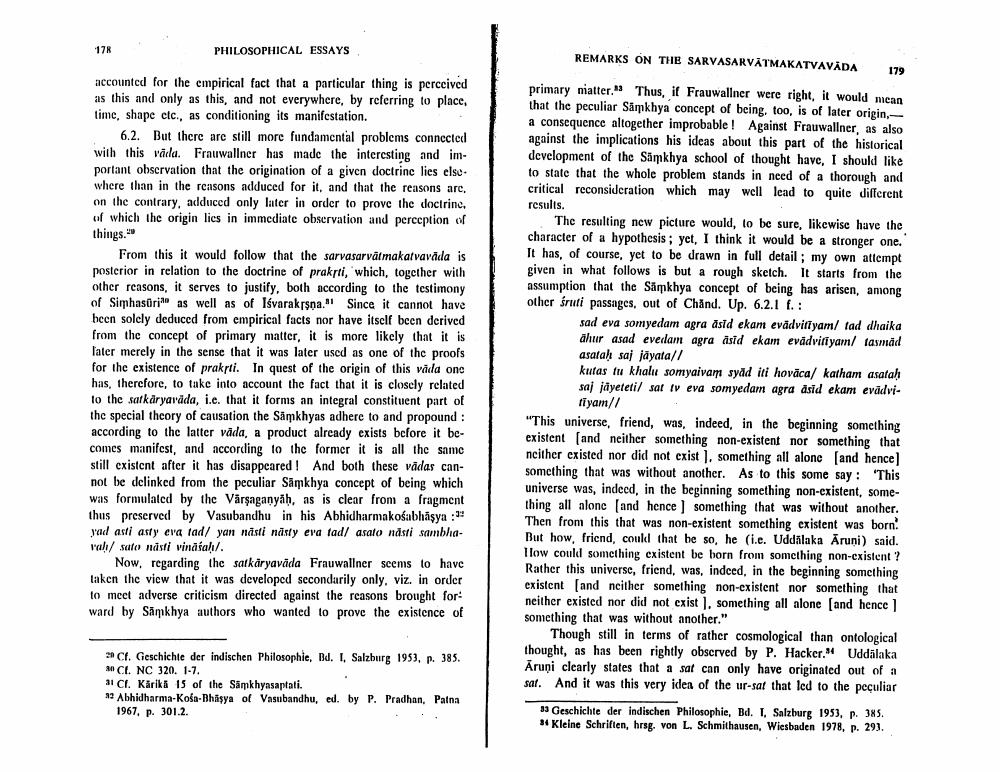Book Title: Remarks On Sarvasarvatmakatvavada Author(s): A Wezler Publisher: A Wezler View full book textPage 7
________________ 178 PHILOSOPHICAL ESSAYS REMARKS ON THE SARVASARVĀTMAKATVAVĀDA 179 accounted for the empirical fact that a particular thing is perceived as this and only as this, and not everywhere, by referring to place, time, shape clc., as conditioning its manifestation. 6.2. But there are still more fundamental problems connected with this vādla. Frauwallner has made the interesting and important observation that the origination of a given doctrine lies else. where than in the reasons adduced for it, and that the reasons are, on the contrary, adduced only later in order to prove the doctrine, of which the origin lies in immediate observation and perception of things. From this it would follow that the sarvasarvatmakarvavada is posterior in relation to the doctrine of prakrti, which, together with other reasons, it serves to justify, both according to the testimony of Simhasório as well as of lśvarakrsna. Since it cannot have heen solely deduced from empirical facts nor have itself been derived from the concept of primary matter, it is more likely that it is Tater merely in the sense that it was later used as one of the proofs for the existence of praksti. In quest of the origin of this váda ono has, therefore, to take into account the fact that it is closely related to the satkaryavada, i.e. that it forms an integral constituent part of the special theory of causation the Samkhyas adhere to and propound: according to the latter váda, a product already exists before it becomes manifest, and according to the former it is all the same still existent after it has disappeared! And both these vadas cannot be delinked from the peculiar Samkhya concept of being which was formulated by the Vårsaganyah, as is clear from a fragment thus preserved by Vasubandhu in his Abhidharmakośabhäsya : yad astiasty era fad/ yan nästi nasty eva fad/ asalo ndsti sambhaval/ sufo násti vindahl. Now, regarding the sarkaryavada Frauwallner seems to have taken the view that it was developed secondarily only, viz. in order to meet adverse criticism directed against the reasons brought for: ward by Sankhya authors who wanted to prove the existence of primary miatter. Thus, it Frauwallner were right, it would mean that the peculiar Sankhya concept of being, too, is of later origin. a consequence altogether improbable! Against Frauwallner, as also against the implications his ideas about this part of the historical development of the Samkhya school of thought have, I should like to state that the whole problem stands in need of a thorough and critical reconsideration which may well lead to quite different results. The resulting new picture would, to be sure, likewise have the character of a hypothesis ; yet, I think it would be a stronger one. It has, of course, yet to be drawn in full detail; my own attempt given in what follows is but a rough sketch. It starts from the assumption that the Samkhya concept of being has arisen, among other śruti passages, out of Chand. Up. 6.2.1 f.: sad eva somyedam agra asid ekam evädvitiyam/ tad dhaika dhur asad everam agra asid ekam evadviti yam/ fasmad asalah saj jayata// kutas tu khalu somyaivam sydd iti hovaca/ katham asalah saj idyeteti/ sat tv eva somyedam agra dsid ekam evadvi tiyam// "This universe, friend, was, indeed, in the beginning something existent (and neither something non-existent nor something that neither existed nor did not exist ), something all alone and hence] something that was without another. As to this some say: 'This universe was, indeed, in the beginning something non-existent, something all alone and hence something that was without another. Then from this that was non-existent something existent was born But how, friend, could that be so, he (i.e. Uddălaka Āruni) said. Ilow could something existent be born from something non-existent? Rather this universe, friend, was, indeed, in the beginning something existent (and neither something non-existent nor something that neither existed nor did not exist ). something all alone (and hence something that was without another." Though still in terms of rather cosmological than ontological thought, as has been rightly observed by P. Hacker. Uddālaka Aruni clearly states that a sat can only have originated out of a sal. And it was this very idea of the ur-sat that led to the peculiar 2 Cf. Geschichte der indischen Philosophie, Bd. I, Salzburg 1953, p. 385. an CE. NC 320. 1-7. 31 Cf. Kärika 15 of the Samkhyasaptati. 12 Abhidharma-Koša-Bhäsya of Vasubandhu, ed. by P. Pradhan, Patna 1967, p. 301.2. 13 Geschichte der indischen Philosophie, Bd. I. Salzburg 1953, p. 385. 34 Kleine Schriften, hrsg. von L. Schmithausen, Wiesbaden 1978, p. 293.Page Navigation
1 ... 5 6 7 8
